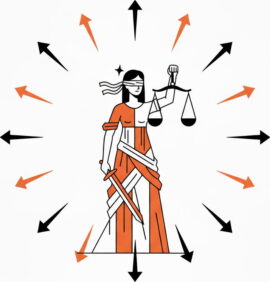SUMMARY Under the Trump administration, federal law enforcement has increasingly targeted political adversaries, including former FBI Director James Comey, state prosecutors and civil society groups. This weaponization of justice undermines core democratic principles—impartiality, fairness, and equal treatment under law. Political prosecutions erode public trust, chill free expression and weaken constitutional checks on executive power. Historical precedents from Nixon’s enemies list to the Espionage Act prosecutions demonstrate how such abuses threaten the rule of law and democratic norms.
Under President Trump, federal law enforcement has moved forcefully to prosecute perceived political adversaries, dramatically increasing public concern over the weaponization of justice. The indictment of former FBI Director James Comey is the highest-profile example. Trump publicly urged his attorney general to prosecute Comey and others linked to earlier investigations into Russian campaign interference. Comey’s indictment for allegedly making false statements to Congress followed the removal of DOJ officials who had resisted pursuing charges against Trump’s opponents, replaced by loyalists lacking prosecutorial experience.

These moves are not isolated. The administration has begun pursuing other critics, including New York Attorney General Letitia James, Georgia prosecutor Fani Willis, Democratic Senators, and donors such as George Soros. Trump’s recent memorandum orders law enforcement to investigate a wide array of civil society groups for alleged “organized political violence,” though these accusations are presented without concrete evidence. Critics argue this campaign of retribution represents a fundamental shift, dismantling long-standing guardrails designed to prevent using the Justice Department for political retaliation.
Why is this dangerous? Political prosecutions undermine the justice system’s core values: impartiality, fairness and equal treatment. When law enforcement is directed to target adversaries of the president, the public loses trust that cases are handled based on facts or law rather than political favor. This threatens the principle that government lawyers should serve the country, not advance any leader’s personal agenda. The chilling effect reaches beyond politicians, discouraging dissent and free expression among journalists, business leaders and everyday citizens. Self-censorship becomes a rational response to fear of retribution.
Worse still, eroding the independence of prosecutors opens the door to future abuses. If presidents learn they can bypass accountability and use justice as a tool of personal vendetta, the system drifts closer to authoritarian patterns, where law enforcement exists to punish opponents and suppress disagreement. Over time, each episode weakens public confidence and threatens constitutional checks on executive power.
Juries and judges offer some protection, with powers to nullify politicized charges or dismiss cases without merit. Yet the recurring spectacle of headline prosecutions—especially when evidence is thin or targeting is overtly political—may damage confidence in justice for years to come. The stakes are not legal technicalities but the functioning of democracy itself.
These concerns are not new in American history. One early example is President Richard Nixon’s infamous “enemies list,” a formal compilation of political adversaries targeted for harassment and investigation by government agencies. This abuse of federal power came to light during the Watergate scandal, which led to multiple convictions of Nixon’s top staff and eventually to his resignation. The Nixon case remains a defining example of how the executive can weaponize law enforcement when unchecked.
Another precedent occurred during World War I, when socialist leader Eugene Debs was prosecuted under the Espionage Act for speeches opposing the war. Debs’ imprisonment was widely seen as an attempt to silence dissent during a tumultuous time, demonstrating how prosecutions can be used to stifle political opposition beyond conventional legal boundaries.

More recently, prosecutions of sitting elected officials during election cycles have occurred. For example, Senator Ted Stevens was prosecuted and convicted during his re-election campaign in 2008, illustrating that legal accountability of politicians can proceed even amid electoral contests, provided that prosecutorial conduct remains fair and nonpartisan.
These historical cases show the delicate balance justice must maintain between enforcing laws and protecting political rights. When prosecutions cross into political targeting or retaliation, democratic norms and the rule of law are at risk, underscoring why current controversies require close attention and vigilance.